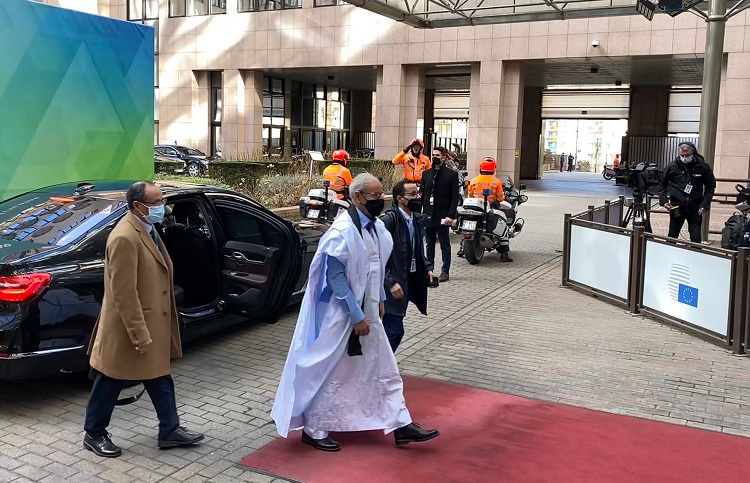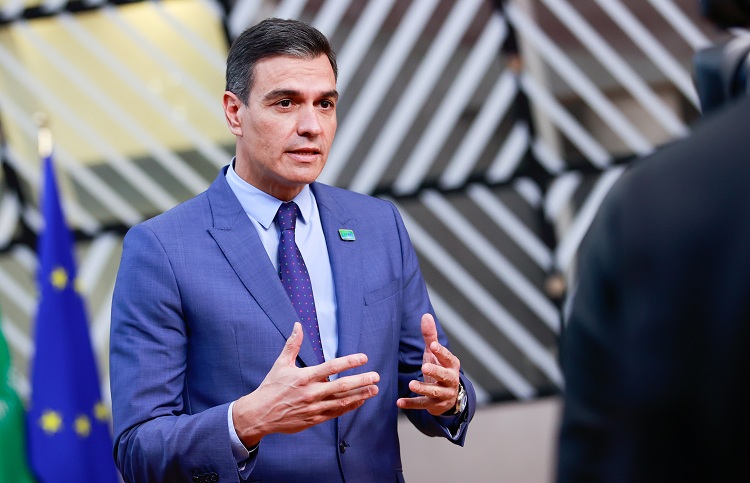Eduardo González
The Moroccan deputies of the Morocco-EU Joint Parliamentary Committee have denounced the presence of the leader of the Polisario Front, Brahim Ghali, at the sixth Summit between the European Union and the African Union, which began yesterday in Brussels and in which Rabat is represented by its Minister of Foreign Affairs, Nasser Bourita, instead of the Prime Minister of Morocco, Aziz Akhannouch, as initially announced.
The presence of Ghali was announced by the Saharawi news agency SPS and confirmed by the EU Council itself, which included the Saharawi leader in the official list of participants. The also president of the Saharawi Arab Democratic Republic (SADR) arrived in Brussels accompanied by a large delegation including Jadjtou Mujtar, deputy representative of the Polisario Front in Madrid.
In a letter addressed to MEPs, the president of the Morocco-EU Joint Parliamentary Committee, Lahcen Haddad, called on his European colleagues to “denounce these maneuvers that tend to damage the positive dynamics that characterize relations between the Kingdom and the EU” and recalled that the “fraudulent entry” in April 2021 of Ghali on Spanish territory “severely tested the strategic partnership with our northern neighbors.” “A possible entry of this individual on the European territory while justice is pursuing him on several charges against him, calls into question the institutional credibility of the entire European Union,” he concluded, quoted by the Moroccan state agency MAP.
Morocco is represented in Brussels by Nourita instead of the Prime Minister, who was scheduled to coincide today with the President of the Government, Pedro Sanchez, at a round table on migration and mobility. It has not been reported whether this change is related to Ghali’s presence. This coincidence was to take place in the midst of the Spanish government’s efforts to redirect its relations with Rabat, clearly deteriorated since May 2021 because of the reception in our country of Brahim Ghali and Morocco’s pressures for Spain to recognize its sovereignty over Western Sahara.
Sanchez co-chaired yesterday the table on Peace, Security and Governance, together with the leaders of Mauritania and Ghana. The roundtable was also attended by the EU High Representative for Foreign and Security Policy, Josep Borrell; the President of the EU Peace and Security Council, the Egyptian Mohamed Omar Gad; and the President of the European Council, Charles Michel.
Mali
Sanchez’s participation at this table coincided with the decision of France and other countries to withdraw their troops in Mali in retaliation for the decision of the coup military junta to expel its ambassador in Bamako. Precisely, the President of France, Emmanuel Macron, gathered on Wednesday evening in Paris the heads of state of the countries involved in the international missions Barkhane – for the fight against terrorism – and Takuba – formed by special units from different European countries – to discuss this decision.
Spain was not invited to this meeting in Paris because it is not part of these missions. On the other hand, Spain currently provides the largest contingent (500 military personnel, 24% of the total) of the European training mission EUTM Mali. Spain has repeatedly insisted that any decision on this mission must be taken by the EU as a whole and has warned that a hasty withdrawal from Mali could degenerate into “another Afghanistan”, in addition to leaving an empty space that could be occupied by other powers, such as China or Russia, in this case through the Russian mercenaries of the Wagner Group.
At the end of the Paris meeting, the participants (Belgium, Benin, Canada, Chad, Côte d’Ivoire, Czech Republic, Denmark, Estonia, France, Germany, Ghana, Hungary, Italy, Mauritania, Niger, Norway, Portugal, Romania, Senegal, Slovakia, Slovenia, Sweden, Togo, European Council, European Commission, European Commission, Coalition for the Sahel and African Union Commission) issued a Joint Declaration in which, among other things, they announced the “coordinated withdrawal from Malian territory of their respective military assets” destined for Barkhane and Takuba “due to numerous obstructions by the Malian transitional authorities”.
They also recalled “the important contribution of the European Union and its missions for peace and security in the Sahel. Precisely, the signatory countries have decided that the withdrawal will be “coordinated” with the EU and the UN because of the impact it will inevitably have on EUTM Mali and on the UN mission, MINUSMA. In this regard, Josep Borrell declared in Paris – where he attended the meeting convened by Macron – that the EU “remains committed to the Sahel and will readapt its military set-up according to the situation in Mali.” “Our determination to fight terrorism remains intact.”







